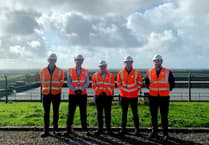The use of ultra-violet treated effluent water to tackle fires is being trialled by the local Fire and Rescue Service for its benefits to the environment, the community and efficient firefighting response.
Fire and Rescue Services use a large amount of water while responding to the variety of incidents they attend, with the average modern fire appliance having an 1,800-litre water capacity. While water is an essential element of the response work by MAWWFRS crews, the large amount of water required can occasionally cause issues for communities, such as low water pressure and dirty water, depending on the location.
In a first for Wales and through working in partnership with Dŵr Cymru Welsh Water and Natural Resources Wales, Mid and West Wales Fire and Rescue Service (MAWWFRS) is trialling the use of ultra-violet (UV tertiary) treated effluent water at fire incidents attend attended by the Service, as an alternative to using drinking water and other water sources.
This new initiative is devised and led by the Service’s Corporate Risk Assurance Manager, Seamus Doyle. As well as reducing the impact on communities, the process will also align with the Service’s environmental objectives, which includes achieving Net Zero Carbon Status by 2030. During a period of increased unpredictability on the world’s water supply, due to changing rainfall patterns and frequent droughts, reducing the reliance on clean water is increasingly important.
Where water supply is limited at an incident, water must be shuttled from various locations which can be up to an hour from the incident, therefore prolonging the incident and delaying response times. In addition to reducing the Service’s environmental impact, Utilising the UV tertiary treated wastewater sites across Wales will also enable crews to respond more efficiently and more quickly to incidents.
A Low-Risk Waste Recovery Operation has been approved and published by Natural Resources Wales allowing the use of UV treated final effluent from Dŵr Cymru Welsh Water permitted Wastewater Treatment Works in emergency firefighting activities by the Fire and Rescue Service.
A spokesperson for Dŵr Cymru Welsh Water said: “We are fully supportive of this initiative. By substituting this volume of water which otherwise would have been taken from the potable water supply it will help in the preservation of our supplies for customers especially in the face of increasing climate change impact on our natural resources.”




